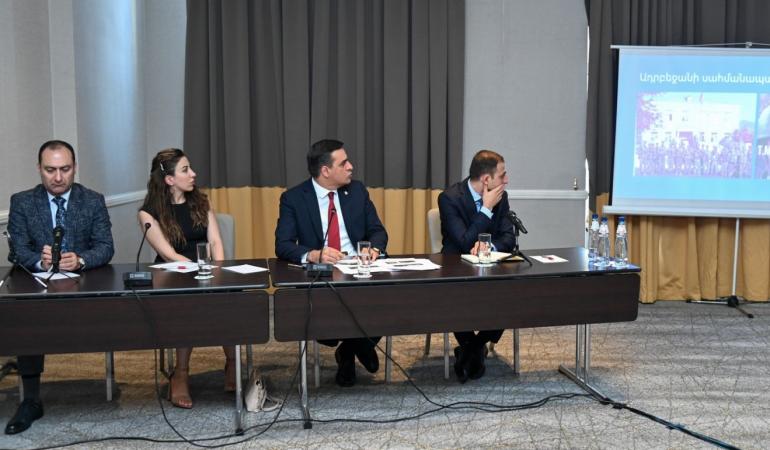
Last week, on September 8, a report was published by the Office of the Human Rights Defender of Armenia, the Yerevan-based International and Comparative Law Center (I.C.Law) and the Washington-based Armenian Legal Center for Justice and Human Rights (ALC). The report gathered evidence from interviews with 40 repatriated POWs and 10 civilian captives and analysis of video recordings.
All 50 survivors testified to physical torture, deprivation of adequate food, water, sleep and medical care.
https://www.youtube.com/watch?v=gs7GyP3sTwU
"With the publication of this report, ALC, in cooperation with the Human Rights Defender and I.C.Law, is trying to methodically present the inhumane treatment of Armenian POWs in order to highlight Azerbaijan's continuous violation of international human rights law," said ALC President Kenneth V. Hachikian.
According to the report, Armenian captives were transported between military police confinements, the State Security Service and a pre-trial detention facility in the settlement of Kurdakhany in Baku, in violation of Geneva Convention III mandating that the captor country transfer POWs to a permanent prisoner camp as soon as possible. Armenian captives were regularly subjected to physical torture at each of these locations. Azerbaijani prison guards deployed belts, screwdrivers, gun butts, metal chains and batons to beat the captives, sometimes multiple times a day. One repatriated POW testified that three guards entered his cell every five minutes to beat him to the point of incapacitation.
"Azerbaijani guards entered our cells and demanded to shout: "Karabakh is Azerbaijan", regardless of whether we obeyed or not, we were brutally beaten both by the Military Police and the State Security System. There were other captives in the cell with me. Three of them were tortured with electric shocks during the interrogation.
According to Geneva Convention III, the capturing country must refrain from violence, physical harm, retaliation, intimidation or discrimination against POWs.
Armenian POWs were not supplied with enough food and water. Several POWs testified that guards forced them to eat food off the ground. One POW got a severe rash due to the poor quality of the drinking water.
"I have been kept alone for the last four months. It was torturous. When they gave us food, most of it was thrown on the ground, so we had to pick up the leftovers ourselves. As soon as they opened the cell door, I had to stand up and say: "Karabakh is Azerbaijan", besides, they repeated Aliyev's statement that Artsakh is Azerbaijani and forced us to repeat what they said."
POWs were also deliberately deprived of sleep. Some were handcuffed to batteries or heating rods, while others were forced to stand or sit for several days. During winter, the prison guards poured buckets of ice water on the prisoners, opened the windows at night, forcing the prisoners to sleep on the cold floor of the prison.
"They tied us to the heating radiators in their military police. We slept on the floor for the first few days. We did not get food or water for several days. I asked them for water, they poured a bucket of cold water on me. All my clothes got wet, they opened the window and laid me on the floor so that I would freeze. They beat us all the time. I lost consciousness twice. We suffered psychologically there as well. In the cell next to ours, when someone was being beaten, we could hear the sounds."
Prison guards consistently refused to provide medical care to POWs. As a result, many POWs developed infections or more severe injuries. A POW, who was sent to the hospital, was deprived of food for 10 days. Azerbaijani soldiers lay next to him in the hospital bed, spitting on him and filming their actions.
According to Geneva Convention III, the captor country must provide POWs with sufficient food, water, clothing and medical care when necessary.
Several POWs testified that during the April 2016 four-day war or the first Artsakh war, soldiers who served additionally were treated with exceptional cruelty. A POW was beaten so badly that he could not walk for 21 days. The criminals said that he was being punished for his activities in the Armenian armed forces.
The Geneva Convention III prohibits measures of reprisal against POWs.
The International Committee of the Red Cross (ICRC) regularly visited POWs and civilian captives. According to witnesses, during these visits, the captives were moved to different cells in order to hide their living conditions.
I.C.Law, in cooperation with ALC, filed requests on behalf of 123 Armenian POWs for interim measures or immediate measures to protect those at immediate risk of irreparable harm; 111 of the petitions have been granted. To date, a total of 104 military and civilian captives have been repatriated to Armenia. While Azerbaijan admits the capture of only 45 people, about 200 POWs and other captives remain in Azerbaijan.